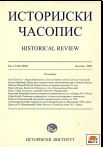"Сиротиње кудељнице" и баштинице: два типа хришћанских удовичких домаћинстава у Османском царству - на примеру Призренског санџака у 16. веку -
"Indigent Hemp-Spinners" and Baština-Owners: Two Types of the Christian Widow's Households in the Ottoman Empire (in the Prizren Sancak, XVI Century)
Author(s): Tatjana KatićSubject(s): History
Published by: Istorijski institut, Beograd
Keywords: Ottoman; widowhood; widow's tax (resm-i-bive); real estate - baština; women crafts; Prizren; Trgovište; Bihor
Summary/Abstract: Official recording of the Christian widow as taxpayer, paying the decreased ispençe by 6 akçe, the so-called widow’s tax (resm-i bîve), represents a custom having already existed in the earliest dated registers of the Ottoman European provinces. The edict issued by Mehmed the Conqueror clearly stated that this tax was to be imposed only to those widows not possessing lands, i.e. those indigent women who earned a living by spinning wool, flax and hemp. These women belonged to the most impoverished stratum of the Ottoman society, and due to this have they enjoyed the particular protection on the part of the local community as well as the tax exemptions. Apart from the widows, taxpayers of the widow’s tax, the widows, owners or co-owners of the real estates – baština - have also been officially recorded in the detailed registers (mufassal). Baština represented hereditary property on the mîrî land, with the precisely established obligations, whose owner had the right to sell it, donate or bequeath to whom he wished. The new owner would, upon the takeover of the baština, take the obligations concerning the estate onto himself likewise. The tax was collected from baština, as well as from the real estates, which were given under tapu to the hereditary tenure of the re‘aya household (hâne). The only difference was that these real estates put under tapu could not be sold nor bought, but stayed in the possession of the families as long as they were able to cultivate them. On the contrary, the sipâhî would give them to whom he preferred. The widows, owners of the baštinas, did not pay the widow’s tax since they had lands in their possession and had thus been treated as taxpayers of the total, and not decreased, amount of the ispençe, i.e. 25 instead of 6 akçe. They were legally assigned to the category the entire family household - of the house (hâne), that is, to the class of the male taxpayers. Due to this, the notion of them is not always noticeable in the Ottoman registers, since the summary registers (icmâl), containing only the enumeration of «hâne», «mücerred» and «bîve» made note of the widows–owners of the baštinas under the category of «hâne».
Journal: Историјски часопис
- Issue Year: 2009
- Issue No: 58
- Page Range: 209-229
- Page Count: 21
- Language: Serbian

